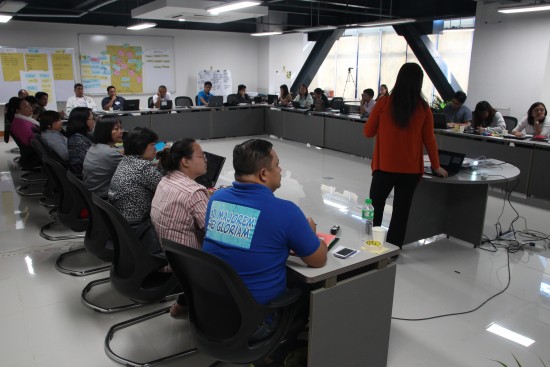Five priority areas of engagement in achieving social change for common good were discussed by advocacy officers during the Policy Advocacy Training (PAT) held at the Ateneo de Davao Community Center last November 3-7, 2014.
PAT enacted Action Point No. 6 of the 10 Action Points of the Mindanao Conversations which states, “Provide greater institutional support for social movements and advocacies that actively lobby for the enactment of laws that better promote social justice and the common good.”
Participants exchanged ideas on the five identified agenda, namely, the Bangsamoro Basic Law (BBL), the Mining Act of 1995, the Indigenous People Rights Act of 1997 (IPRA), the Freedom of Information (FOI) Bill, and Electoral Reforms.
Advocacy officers of Jesuit Higher Education Institutions (JHEIs) and Missions were from Bukidnon Mission, Ateneo de Davao University (AdDU), Ateneo de Manila University (AdMU), Ateneo de Naga University (AdNU) , Ateneo de Zamboanga University (AdZU) and Xavier University (XU). The training employed approaches and techniques in participatory learning to facilitate the discourse.
The four-day training officially commenced as Jeremy Eliab, AdDU’s Assistant to the President, gave his welcome remarks. Fr. Archimedes “Kim” Lachica, SJ, AdDU’s minister of administrators, faculty, and staff discussed the promotion of justice as the mission of Jesuit institutions. This was followed by an open forum among the participants.
Pamela Grafilo, a resource speaker from University of the Philippines Diliman, headed both workshop and the discussions during the second day. It was filled with sessions on the introductory overview of the advocacy elements to be discussed throughout the training.
PAT’s Day 3 focused on exploring the five different areas of engagement. Datu Mussolini Lidasan from AdDU’s Al Qalam Institute highlighted four salient features as he talked about the BBL. One of the participants proposed that the BBL must be included in the basic education curriculum. She added that there is a need for the school children to have an idea of what BBL is.
Atty. Jarley Sulay-Trugillo from Xavier University tackled the loopholes of the Mining Act of 1995. “The Filipinos are not the ones utilizing, not developing, not using, the minerals that are extracted from our lands,” Atty. Trugillo asserted. Furthermore, she pointed out that the mining industry in the country minimally contributed only 0.6% of the 2013 GDP.
“Just saving IPRA is a struggle,” said Fr. Albert Alejo, SJ, AdZU’s Assistant for Social Development. The indigenous people in Mindanao continue to struggle in asserting their identity. He added that the form of solidarity must be adjusted for the IPs. Fr. Alejo concluded with “Sa totoo lang, papasa ba yung BBL kung walang IPRA?”
The conversation on the FOI Bill was the last session for the third day. Joy Aceron from AdMU laid down the salient features of the FOI Bill and what it seeks to address. One of the utmost features of the bill is “to provide a standard and definite procedure in dealing with requests for information.” The Bill’s current status is tied up in the previous 15th Congress because the Malacañang has reservations on some of its provisions.
PAT’s first session during the last day was about the Electoral Reforms as delivered by Aceron. She zeroed in on the Proposed Political Party Reform Bill regarding the financing of electoral campaigns, addressing the political turncoatism, and registration and accreditation to promote accountability and transparency.
The presentation of workshop results and plenary discussion, and the presentation of advocacy plans were further discussed.
PAT ended with the celebration of the Holy Eucharist officiated by Fr. Jomari Manzano, SJ. Atty. Romeo Cabarde, Jr., distributed the tokens and certificates, and delivered the closing message and acknowledgments.
